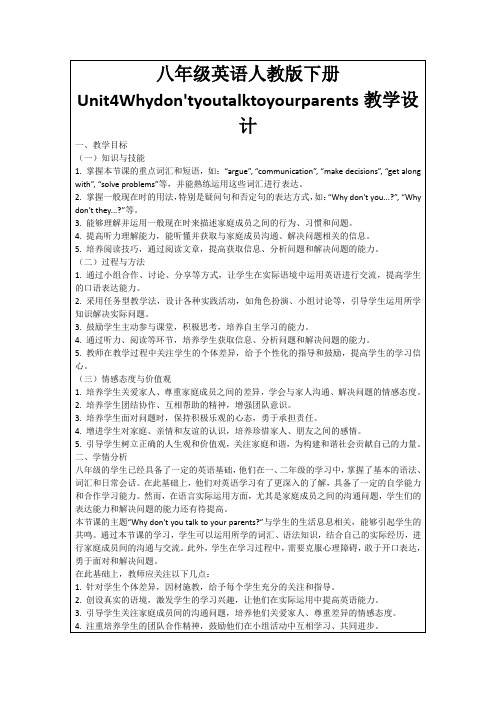八年级英语下册Unit4Whydon'tyoutalktoyourparents第2课时作业新版
八年级英语人教版下册Unit4Whydon'tyoutalktoyourparents教学设计

(4)巩固:通过听力、阅读练习,帮助学生巩固所学知识,提高听力和阅读能力。
(5)拓展:鼓励学生课后观察和思考家庭成员之间的沟通问题,尝试用英语与家人进行有效沟通,将所学知识运用到实际生活中。
3.教学评价设想:
5.引导学生树立正确的人生观和价值观,关注家庭和谐,为构建和谐社会贡献自己的力量。
二、学情分析
八年级的学生已经具备了一定的英语基础,他们在一、二年级的学习中,掌握了基本的语法、词汇和日常会话。在此基础上,他们对英语学习有了更深入的了解,具备了一定的自学能力和合作学习能力。然而,在语言实际运用方面,尤其是家庭成员之间的沟通问题,学生们的表达能力和解决问题的能力还有待提高。
5.教师在教学过程中关注学生的个体差异,给予个性化的指导和鼓励,提高学生的学习信心。
(三)情感态度与价值观
1.培养学生关爱家人、尊重家庭成员之间的差异,学会与家人沟通、解决问题的情感态度。
2.培养学生团结协作、互相帮助的精神,增强团队意识。
3.培养学生面对问题时,保持积极乐观的心态,勇于承担责任。
4.增进学生对家庭、亲情和友谊的认识,培养珍惜家人、朋友之间的感情。
(1)形成性评价:关注学生在课堂活动中的表现,鼓励学生积极参与,给予及时的反馈和指导。
(2)终结性评价:通过单元测试、口语表达等形式,全面评估学生的学习效果。
(3)个性化评价:针对学生的个体差异,给予个性化的评价和指导,激发学生的学习兴趣和自信心。
四、教学内容与过程
(一)导入新课
1.教师展示一幅家庭成员争吵的图片,引导学生观察并思考:“What is happening in this picture? Can you guess why they are arguing?”
【人教版】八年级英语下:Unit4 Why don’t you talk to your parents单元学案(含答案)

Unit 4 Why don’t you talk to your parents?一、What is wrong with you?(2 x 14)1. 作业太多_________________________2. 睡眠不足___________________________3. 没有空闲_________________________4. 父母不许___________________________5. 太多课外班________________________6. 与…..打架__________________________7. 关系不好________________________ 8. 生…..的气_________________________9. 感觉寂寞和紧张____________________ 10. 需要更多时间进行正常的交流______________ 11. 给我很大的压力____________________ 12. 不得不与同学竞争____________________ 13. 借东西不还________________________ 14. 同其他孩子比较____________________二、What should I do? (2x 6)1. 打电话讨论某事_____________________2. 提供帮助________________________3. 坐下来谈谈________________________4. 应该解释________________________5. 独自一个人呆着_______________________6. 不给孩子太大压力___________________三、other phrases (2 x 8)1. 不是什么问题_____________________2. 希望事情能解决__________________________3. 同意…..的建议_______________________4. 考上一个好高中__________________________5. 训练体育项目________________________6. 典型的美国家庭__________________________7. 从小就开始竞争________________________8. 一个孩子的发展__________________________四、Sentences(3 x 15)1. —我应该怎么办?—为什么不忘了呢?虽然她做错了,这也不是什么大不了的事情。
人教版八年级英语下册Unit 4 Why don’t you talk to your parent

1. Why don’t you talk to your parents? 为什么不跟你的父母谈谈呢?
【自主领悟】(1)Why don’t you do sth. ? 这是一个否定疑问 句, “为什么不……? ”常用来征求意见和提出建议, 相当于 Why not do sth. ? 句式。例如: Why don’t you go with us? = Why not go with us? 为什么不同我们一起去呢? (2)talk to sb. 意为“同某人谈话”。例如: He talked to me about my study. 他跟我谈了关于我的学习的事情。
Unit 4 Why don’t you talk to your parents?
Section A (1a-2d)
Ⅰ. 短语互译 1. get enough sleep 2. have a fight with sb. 3. look through 4. hang out 5. 把……归还给…… 6. 允许某人干某事 7. 成功地发展; 解决 答案: 1. 有足够的睡眠 2. 跟某人打架 3. 浏览 4. 闲逛 5. give. . . back to. . . 6. allow sb. to do sth. 7. work out
【归纳拓展】allow的不同搭配 (1)allow sth. /doing sth. 允许(做)某事 例如: We don’t allow eating in the classroom. 我们不允许在教室里吃饭。 (2)allow sb. sth. (双宾语)给予某人某物 例如: He allows his son too much money. 他给他儿子太多的钱。
speak to sb. “跟某人讲话”
人教新目标八年级英语下册Unit4Whydon'tyoutalktoyourparents说课稿

人教新目标八年级英语下册Unit 4 Why don’t you talk to your parents说课稿一. 教材分析人教新目标八年级英语下册Unit 4 Why don’t you talk to your parents是一篇关于日常交流和沟通的文章。
本篇文章主要讲述了在遇到问题时,如何与父母沟通,寻求解决方案。
通过本节课的学习,学生能够掌握情态动词why not的用法,以及如何运用交际策略进行日常交流。
教材内容贴近学生生活,有利于激发学生的学习兴趣和积极性。
二. 学情分析八年级的学生已经掌握了基本的英语语法和词汇,具备一定的听说读写能力。
但在实际交流中,学生往往因为害羞、紧张等原因不敢开口说英语,本题正好可以引导学生学会如何与父母沟通,提高他们的交际能力。
同时,学生在这个年龄段开始关注家庭和社交问题,对本节课的内容会产生浓厚兴趣。
三. 说教学目标1.知识目标:学生能够掌握情态动词why not的用法,了解日常交际中的沟通策略。
2.能力目标:学生能够运用所学知识进行日常交流,提高口语表达能力。
3.情感目标:学生学会与父母沟通,增进家庭关系,培养良好的交际习惯。
四. 说教学重难点1.重点:情态动词why not的用法和日常交际策略。
2.难点:如何运用所学知识进行实际交流,克服羞涩、紧张等心理障碍。
五. 说教学方法与手段1.情景教学法:通过设定情景,让学生在实际语境中学习英语,提高交际能力。
2.任务型教学法:学生分组完成任务,激发学习兴趣,培养合作精神。
3.互动式教学法:教师与学生互动,引导学生积极参与课堂讨论,提高口语表达能力。
六. 说教学过程1.导入:用一段关于家庭沟通的短片引出本节课的主题,激发学生的学习兴趣。
2.新课呈现:教师展示文章,引导学生关注文章标题和关键词,预测文章内容。
3.课堂讲解:教师讲解情态动词why not的用法和日常交际策略,让学生通过例句理解并掌握。
4.实践环节:学生分组进行角色扮演,运用所学知识进行实际交流,教师巡回指导。
人教八年级英语下册《Unit4 Why don't you talk to your parents

2.有毛病,错误的 4.午夜,子夜 6.猜测,估计 8.重要的事 10.和睦相处,关系良好 12.交流,沟通(n.) 14.云,云朵 16.代替,反而 18.焦虑的,担忧的 20.正确的,恰当的 22.交流,沟通(v.) 24.清楚易懂的,晴朗的 26.归还,回来
1.look through 浏览
He is looking through the books in the library.
look around 四处张望 look up 向上看;查找 look into 调查 look after 照顾;照看 look at 看看 look for 寻找
2 .Although she’s wrong , it’s not a big deal. 尽管她做得不对,但也没什么大不了的。 although 引导让步状语从句 虽然;尽管 big deal 重要的事情或状况 It is not a big deal.= It is no big deal. deal n. 协议;交易 n.大量 a good / great deal (of sth) vi.处理;应对 deal with
3 Hope things work out. 希望事情会好起来。 work out解决(问题)改善(状况)
Do you want to stay with us to see how things work out?
1.用功学习
2.得到足够的睡眠
八年级英语下册 Unit 4 Why don’t you talk to your

Lower stress
listen to beautiful music or songs
go to dance with my friends
go shopping with my friends watch movies
play sports
get enough sleep
spend time alone talk to my good friends
Lower stress
Order the activities:
____ play sports ____ hang out with friends ____ talk to parents or other family members ____ spend time alone ____ play computer games ____ read books ____ watch movies ____ other: ____________________
1C LISTEN AND CHECK THE PROBLEMS WEI MING TALKS
ABOUT.
___ My parents give me a lot of pressure about school.
___ I don’t get enough sleep. ___ I don’t have enough free time. ___ I had a fight with my parents. ___ I have to compete with my classmates at
2. Life shouldn’t just be about ________ . Free time activities like ________ and hanging out with friends are important, too.
八年级下册英语Unit 4 Unit 4 Why don't you talk to your
Unit 4 Why don’t you talk to your parents?话题:人际交往(Interpersonal communication)功能:1能询问、陈述自己或他人的困难和麻烦(Talk about problems)A: What’s wrong?B: I’m really tired because I studied until midnight last night.A: You look sad, Kim. What's wrong?B: Well, I found my sister looking through my things yesterday. She took some of my new magazines and CDs.A: What's the matter, Peter?B: I had a fight with my best friend.2能针对别人的困境提出解决的办法和建议(Give advice)A: What should I do?B: Well, you should call him so that you can say you're sorry.语法:1能正确使用情态动词could, should表达建议或劝告(Modal verbs: could, should) You could go to his house.He should talk to his friend so that he can say he’s sorry.2能正确使用Why don't you…?句型表达建议Why don't you go to sleep earlier this evening?Why don’t you forget about it so that you can be friends again?Why don’t you talk about these feelings with your family?3能正确使用连词until, so that, although (Conjunctions: until, so that, although)The tired children don't get home until after 7: 00 p.m.Maybe you could do more jobs around the house so that they have more time for proper communication.Although it's normal to want successful children, it's even more important to have happy children.词汇和常用表达:正确使用下列词汇(Curriculum words)allow, guess, argue, offer, communicate, explain, copy, return, compete, continue,compare, push, cause, deal, relation, communication, cloud, member, pressure, opinion, skill, football, development, wrong, elder, nervous, proper, clear, typical, quick, crazy, usual, instead, secondly, anymore, perhaps, whatever2能正确使用下列常用表达(Useful expressions)look through, big deal, work out, get on with, cut out, compare…with, in one's opinion 学习策略:1学会在语境中感悟和体会词汇含义, 找出意思相近或相同的语言表达2学会根据上下文猜测生词的含义文化知识:中西方家长对待孩子参加课外活动和课外学习班的态度与做法。
英语人教版八年级下册Unit 4 Why don’t you talk to y
Unit 4 Why don’t you talk to your parents?Section B 2a-2e殷家城九年制学校冉灵丹教学目标:1.通过阅读这篇文章, 学会猜测文中生单词的意思。
2.在理解文章的基础上进行归纳表述,以及自主发表观点。
3.培养学生的阅读能力及掌握文章中黑体词词义4.培养学生正确看待问题,教育学生面对压力或负担并找出解决的方法。
重点难点:1、培养学生根据上下文猜词的能力,在理解篇章的基础上进行归纳表述,以及自主发表观点和建议的能力。
2、学会放松。
教学过程:Step 1. Lead-in:1.What activities do you usually do after school?2.What activities do you want to do but you can not do?(通过谈论学生课外活动,为阅读文章做铺垫)Step 2. Reading:1.Skim the article and answer the questions 2b.(1).What is the common problem for Chinese and American families?(2).Who gives their opinions about the problem?2.Guessing the meaning.(2c)3.Detail reading.Check the answers(T/F)(1). Chinese children have to take so many after-school classeson weekends these days.(2).Cathy Taylor really wants her three children to be successful,so she believes these after-school activities are important for them.(3). Linda Miller thinks parents should send their small kids toall kinds of classes.(4). Linda thinks some parents push their kids too much.(5).Alice thinks kids shouldn’t have time to relax and think forthemselves.Step 3. After reading:Discuss the questions with a partner in groups.(1).What do you think of after-school activities?(2).What should you do to relax?Step 4. Summary:Step 5. Homewor1. Read the article again after school.2. Write a short passage about Cathy’s daily life and her opinions about the education of the kids.板书设计:Unit 4 Why don’t you talk to your parents?。
新人教版八年级英语下册Unit 4 Why don’t you talk to your parents 说课稿、教学设计及教后反思
Unit 4 Why don’t you talk to your parents? 说课稿一、教材分析(一)教材的地位和作用本课的中心话题是谈论同学们生活及学习中的问题和困难并提出合适的建议,从而展开教学活动。
学习本课的内容为整个单元打下基础,同时也是英语教学中拓展学生思维的重要环节。
(二)教学目标的确立和依据根据《新课程标准》的要求,为了完成正常的教学任务,有效地培养学生的自信,创新精神和合作互助的能力,我确立如下的教学目标:1、语言知识:学生能够使用以下词汇:too much, enough, allow, hang out, fight,wrong, midnight.句型:----What’s wrong?----I have to study too much so I don’t get enough sleep. ----Why don’t you talk to your parents?2、语言技能:(1)学完本课,让学生学会用英语说出学习和生活中的问题和困难,并能根据别人的问题给出合适的建议。
(2)能运用所学单词、短语及句型,结合实际生活进行灵活运用。
3、学习策略:(1)自主学习:要求学生采用自主学习的方式,能根据需要进行有目的的预习。
(2)合作学习:在活动中相互探讨,相互交流与合作,从而获得知识、技能和情感体验。
4、情感态度:(1)通过说出自己学习和生活中的问题和困难,让同学们学会释放压力,增加自信,热爱生活。
(2)通过给别人提建议,培养学生团结互助的精神,增进同学之间的感情。
5、文化意识:(1)了解中西方文化差异:我们比较委婉,而西方人则更直接一些,对学生进行不同文化意识的渗透。
(三)教学重点和难点:1.重点:让学生用英语说出学习和生活中的问题和困难,并且给出别人一些合适的建议,注意提建议的句型及用法和建议形式的多样化。
2.难点:用英语给出合适的建议是一大难点,词汇和短语搭配等基本功要扎实。
通用版八年级英语下册Unit4Whydon'tyoutalktoyourparents单元写作专项作
9.b_e_ca__u_sቤተ መጻሕፍቲ ባይዱe__ you don't agree on something.So be 10.s_u_r_e_____ to understand what he/she is saying.
Unit 4 Why don’t you talk to your parents?
单元写作专项
目录页
单元话题分析 素材积累 写作训练
本单元以“谈论问题和提建议”为话题展开,主要讲 述我们在交往中遇到的各种烦恼、感受,以及相应的合理 建议。我们在生活中会遇到各种各样的烦恼,而且这些烦 恼会使我们压力过大、对生活没有信心,因此处理这些烦 恼尤为重要。学习本单元后,我们要能够在文章中叙述自 己的烦恼和想法,并且对他人的烦恼给出合理的建议。
二、根据汉语意思完成句子。
1I.st我ud昨ied晚u学nt习il 到mi半dn夜ig,ht 因las此t n没ig有ht休,息so好I d。id(nu'nttgile)t enough sleep. 2.虽然是她错了,但这并不是个大问题。(deal) _A__lt_h_o_u_g_h__s_h_e_i_s_w_r_o_n_g_,__i_t_'s_n_o__t _a_b_i_g_d_e_a_l_._________
communicate with our parents by sharing our joys and worries with them.Then , we can help do some housework to show our love for them.Finally ,we should achieve a balance between our schoolwork and hobbies so that they won't feel worried about us.
